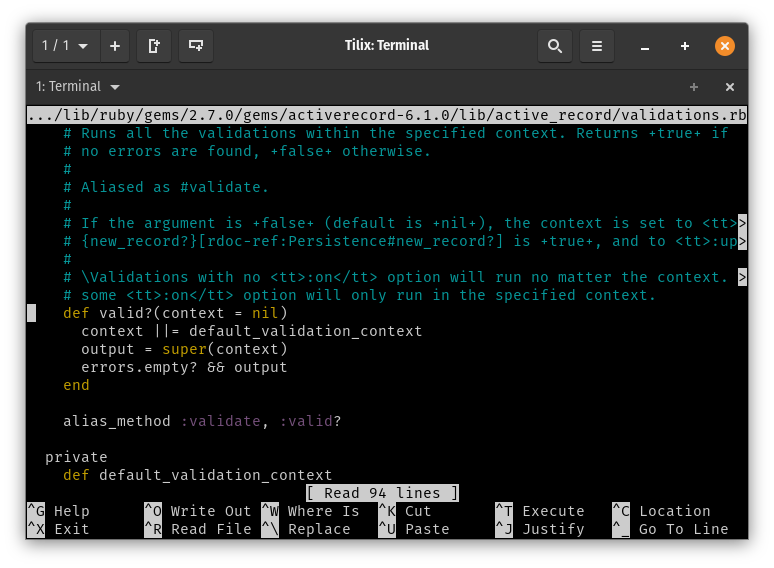Introduction
Pry is a runtime developer console and IRB alternative with powerful introspection capabilities. Pry aims to be more than an IRB replacement. It is an attempt to bring REPL driven programming to the Ruby language.
Key features
- Syntax highlighting
- Source browsing
- Source editing
- Breakpoints
- Method and property inspection of objects
- Runtime invocation
Installation
To get started using Pry, simply include the gem 'pry-rails' and 'pry-doc' in your Gemfile, and bundle install! Now every time you boot your rails console you’ll have a Pry shell.
Usage
To start using pry in our rails app, just type rails console and pry REPL(read-evaluate-print-loop) will be started.
show-routes
will show all the routes in the rails app.
show-routes
Prefix Verb URI Pattern Controller#Action
users GET /users(.:format) users#index
POST /users(.:format) users#create
new_user GET /users/new(.:format) users#new
edit_user GET /users/:id/edit(.:format) users#edit
user GET /users/:id(.:format) users#show
PATCH /users/:id(.:format) users#update
PUT /users/:id(.:format) users#update
DELETE /users/:id(.:format) users#destroy
show-models
will show all the models in the rails app.
show-models
User
id: integer
email: string
password: string
created_at: datetime
updated_at: datetime
binding.pry
It will stop execution and start a REPL (read-evaluate-print-loop), allowing us to dynamically type Ruby code, which gets evaluated, and we can see the result.
We can acess all the local variables in that instance.
def index
@users = User.all
binding.pry
end
Processing by UsersController#index as HTML
[1] pry(#<UsersController>)> @users
User Load (0.2ms) SELECT "users".* FROM "users"
↳ app/controllers/users_controller.rb:8:in `index'
=> [#<User:0x00007f7115564040
id: 1,
email: "Zeeshan1414@gmail.com",
password: "[FILTERED]",
created_at: Thu, 17 Dec 2020 11:59:07.235965000 UTC +00:00,
updated_at: Thu, 17 Dec 2020 11:59:07.235965000 UTC +00:00>]
[2] pry(#<UsersController>)> exit
```
## cd
By using cd you can access classes, objects and methods as if they were folders.
```ruby
user = User.first
(0.6ms) SELECT sqlite_version(*)
User Load (0.2ms) SELECT "users".* FROM "users" ORDER BY "users"."id" ASC LIMIT ? [["LIMIT", 1]]
=> #<User:0x000055f751c41258
id: 1,
email: "Zeeshan1414@gmail.com",
password: "[FILTERED]",
created_at: Thu, 17 Dec 2020 11:59:07.235965000 UTC +00:00,
updated_at: Thu, 17 Dec 2020 11:59:07.235965000 UTC +00:00>
[3] pry(main)> cd user
[4] pry(#<User>):1> self
=> #<User:0x000055f751c41258
id: 1,
email: "Zeeshan1414@gmail.com",
password: "[FILTERED]",
created_at: Thu, 17 Dec 2020 11:59:07.235965000 UTC +00:00,
updated_at: Thu, 17 Dec 2020 11:59:07.235965000 UTC +00:00>
email
=> "Zeeshan1414@gmail.com"
[12] pry(#<User>):1> password
=> "password"
cd email
[15] pry("Zeeshan1414@gmail.com"):2>
```
## ls
It will list all the variables, objects and methods.
```ruby
[15] pry("Zeeshan1414@gmail.com"):2> ls
ActiveSupport::Dependencies::ZeitwerkIntegration::RequireDependency#methods:
require_dependency
Comparable#methods: < <= > >= between? clamp
MessagePack::CoreExt#methods: to_msgpack
JSON::Ext::Generator::GeneratorMethods::String#methods: to_json_raw to_json_raw_object
String#methods:
% delete_prefix! lines strip
* delete_suffix ljust strip!
+ delete_suffix! lstrip strip_heredoc
+@ demodulize lstrip! sub
-@ downcase match sub!
<< downcase! match? succ
<=> dump mb_chars succ!
== each_byte next sum
=== each_char next! swapcase
=~ each_codepoint oct swapcase!
[] each_grapheme_cluster ord tableize
[]= each_line parameterize titlecase
acts_like_string? empty? partition titleize
as_json encode pathmap
```
## help
Show a list of commands or information about a specific command.
```ruby
Help
help Show a list of commands or information about a specific command.
Context
cd Move into a new context (object or scope).
find-method Recursively search for a method within a class/module or the current namespace.
ls Show the list of vars and methods in the current scope.
pry-backtrace Show the backtrace for the pry session.
raise-up Raise an exception out of the current pry instance.
reset Reset the repl to a clean state.
watch Watch the value of an expression and print a notification whenever it changes.
whereami Show code surrounding the current context.
wtf? Show the backtrace of the most recent exception.
Editing
! Clear the input buffer.
amend-line Amend a line of input in multi-line mode.
edit Invoke the default editor on a file.
hist Show and replay readline history.
play Playback a string variable, method, line, or file as input.
```
## show-doc
to see documentation for methods or Objects you are not sure about.
```ruby
[54] pry(#<User>):1> show-doc valid?
From: /home/zeeshan/.rbenv/versions/2.7.2/lib/ruby/gems/2.7.0/gems/activerecord-6.1.0/lib/active_record/validations.rb:56:
Owner: ActiveRecord::Validations
Visibility: public
Signature: valid?(context=?)
Number of lines: 10
Runs all the validations within the specified context. Returns true if
no errors are found, false otherwise.
Aliased as #validate.
If the argument is false (default is nil), the context is set to :create if
{new_record?}[rdoc-ref:Persistence#new_record?] is true, and to :update if it is not.
\Validations with no :on option will run no matter the context. \Validations with
some :on option will only run in the specified context.
```
## find-method
for looking up methods/objects whose names you do not remember.
```ruby
[56] pry(#<User>):1> find-method as_json
#<Class:0x000055f7516ee7b0>#as_json
ActiveModel::Serializers::JSON
ActiveModel::Serializers::JSON#as_json
ActiveRecord::Delegation
ActiveRecord::Delegation#as_json
Enumerable
Enumerable#as_json
Exception
Exception#as_json
Object
Object#as_json
Struct
Struct#as_json
```
## show-source
to quickly see the method definitions of code you want to understand better.
`show method` can also be used.
```ruby
[57] pry(#<User>):1> show-source valid?
From: /home/zeeshan/.rbenv/versions/2.7.2/lib/ruby/gems/2.7.0/gems/activerecord-6.1.0/lib/active_record/validations.rb:56:
Owner: ActiveRecord::Validations
Visibility: public
Signature: valid?(context=?)
Number of lines: 5
def valid?(context = nil)
context ||= default_validation_context
output = super(context)
errors.empty? && output
end
```
## edit
It opens the file in editor and take you to that line of method.
```ruby
[61] pry(#<User>):1> edit valid?
```

## .shell-command
By prepending a dot(.) before the command, we can use the shell command inside the pry REPL as well.
```
[3] pry(#<User>):1> .ls
app db node_modules Rakefile vendor
babel.config.js Gemfile package.json README.md yarn.lock
bin Gemfile.lock postcss.config.js storage
config lib public test
config.ru log q tmp
```
## exit-all
It will exit the pry REPL from the terminal.
```ruby
[6] pry(#<User>):1> exit-all
```
# References
* https://github.com/pry/pry/wiki
* http://railscasts.com/episodes/280-pry-with-rails
* https://medium.com/rubyinside/powering-your-ruby-rails-development-with-pry-3d5dbd2a8b80
* https://devhints.io/pry


Top comments (0)